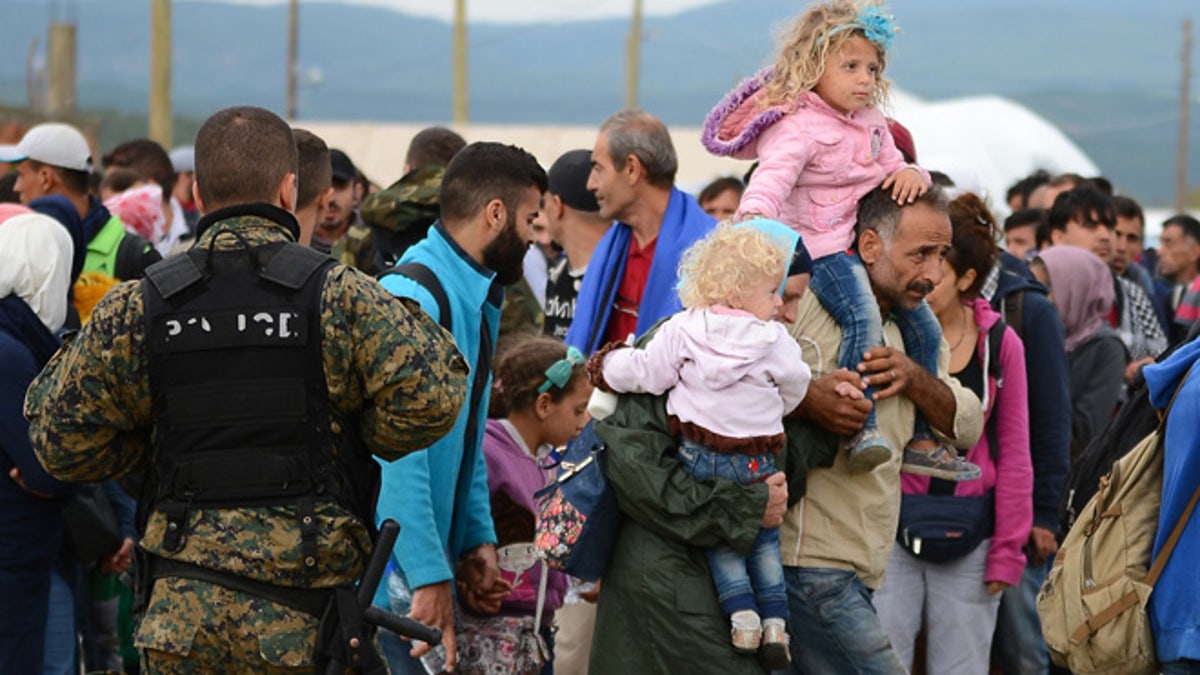
Sept. 8, 2015: People gather at a refugee camp in the southern Macedonian town of Gevgelija. (AP Photo/Borce Popovski)
The Obama administration says it is "actively considering" ways to be more responsive to the global migrant crisis, including refugee resettlement.
Peter Boogaard, a spokesman for the National Security Council, said the United States is in contact with countries in the Middle East and Europe grappling with the influx of more than 340,000 people from the Middle East, Africa and Asia. Many are fleeing the civil war in Syria and areas in Iraq under the control of Islamic State militants.
He did not elaborate on specific measures being considered, but said they included "refugee resettlement." Boogaard noted that the U.S. has provided over $4 billion in humanitarian assistance since the Syrian crisis began, and over $1 billion in assistance this year.
On Monday, Democratic presidential front-runner Hillary Rodham Clinton called in an Associated Press interview for a "concerted global effort" to assist the refugees.
The situation has also led to calls for the U.S. to take a greater role in the crisis by expanding its refugee program and making it easier for immigrants to navigate the cumbersome and time-consuming process. The U.S. has sometimes expedited resettlement, as it did in 1975, when it helped tens of thousands of refugees from South Vietnam and other nearby areas settle in the United States after the fall of Saigon.
For fiscal year 2015, which began Oct. 1, the U.S. government authorized 70,000 refugees to be resettled in the United States. The cap is set by the White House, which works with Congress and takes into account funding and the potential social and economic impact of refugees in the country.
The Obama administration says it is "actively considering" ways to be more responsive to the global migrant crisis, including refugee resettlement.
Peter Boogaard, a spokesman for the National Security Council, said the United States is in contact with countries in the Middle East and Europe grappling with the influx of more than 340,000 people from the Middle East, Africa and Asia. Many are fleeing the civil war in Syria and areas in Iraq under the control of Islamic State militants.
He did not elaborate on specific measures being considered, but said they included "refugee resettlement." Boogaard noted that the U.S. has provided over $4 billion in humanitarian assistance since the Syrian crisis began, and over $1 billion in assistance this year.
On Monday, Democratic presidential front-runner Hillary Rodham Clinton called in an Associated Press interview for a "concerted global effort" to assist the refugees.
The situation has also led to calls for the U.S. to take a greater role in the crisis by expanding its refugee program and making it easier for immigrants to navigate the cumbersome and time-consuming process. The U.S. has sometimes expedited resettlement, as it did in 1975, when it helped tens of thousands of refugees from South Vietnam and other nearby areas settle in the United States after the fall of Saigon.
For fiscal year 2015, which began Oct. 1, the U.S. government authorized 70,000 refugees to be resettled in the United States. The cap is set by the White House, which works with Congress and takes into account funding and the potential social and economic impact of refugees in the country.
